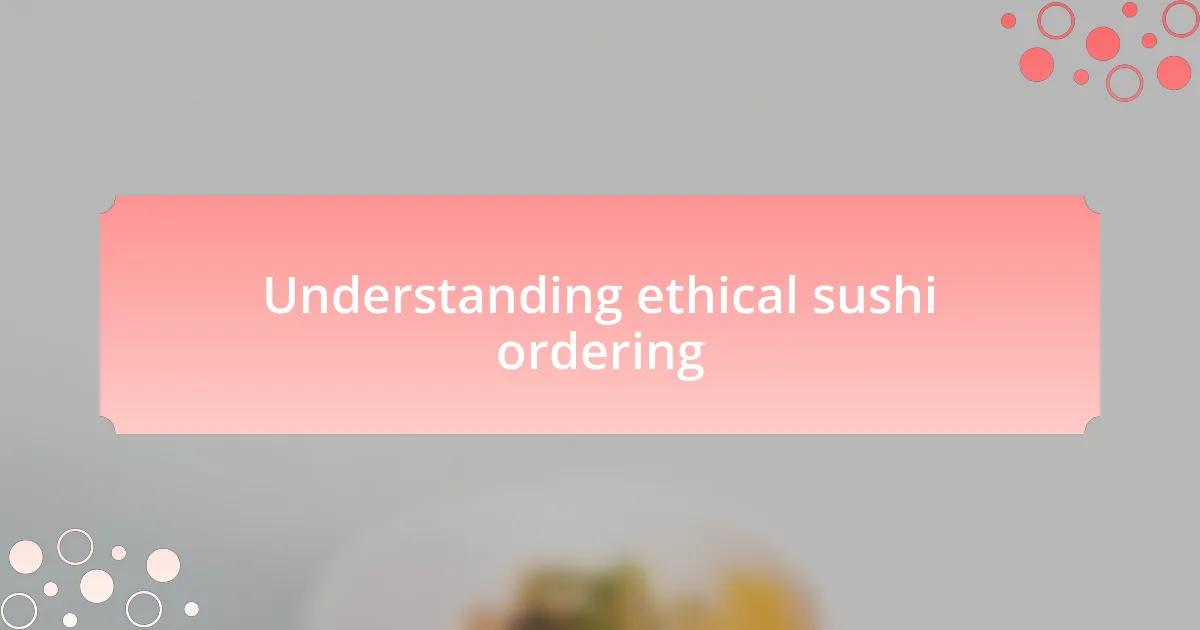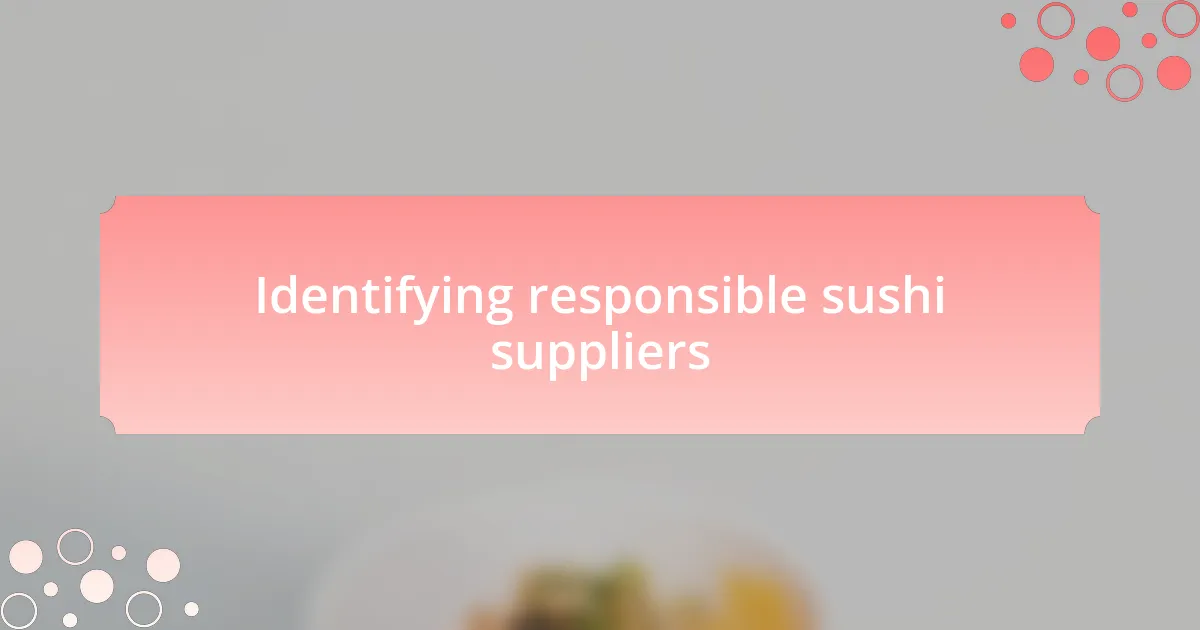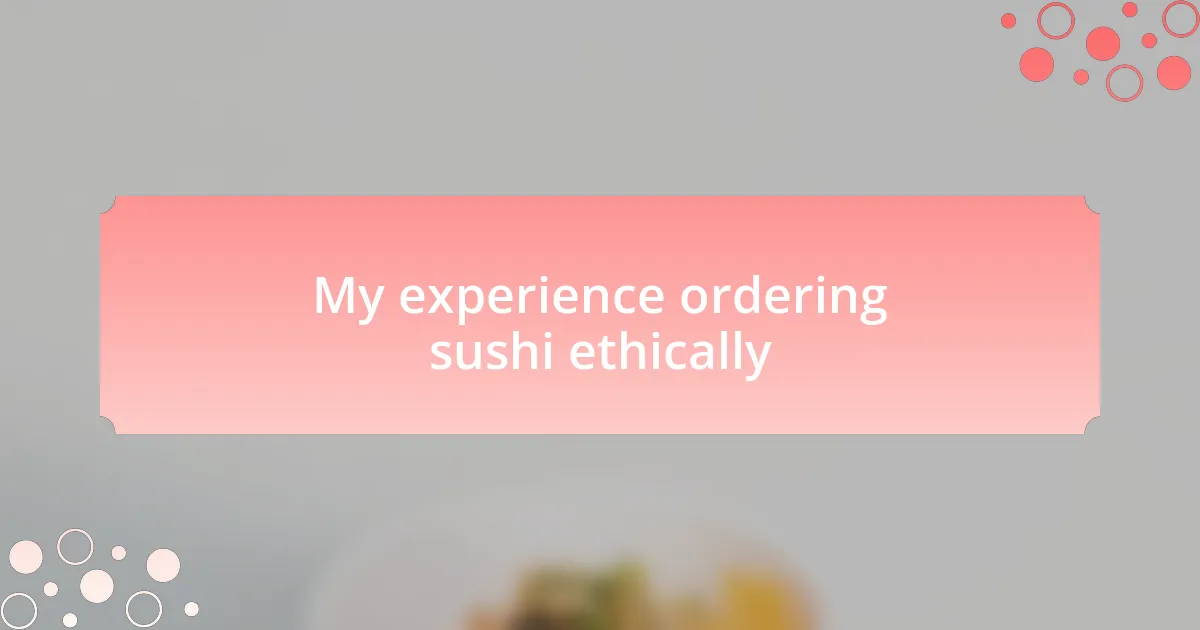Key takeaways:
- Ethical sushi ordering emphasizes the importance of sourcing sustainable seafood to protect marine ecosystems and promote responsible fishing practices.
- Researching restaurants’ practices, certifications, and community involvement can enhance the dining experience and support environmental sustainability.
- Choosing locally sourced ingredients not only improves flavor but also helps reduce the carbon footprint, fostering connections with local fishermen.

Understanding ethical sushi ordering
When I first delved into the world of sushi, I found myself captivated by the artistry and culture behind each roll. But then came the realization that some options were unsustainable or even harmful to the oceans. This awareness prompted me to ask myself, “How can I indulge in my love for sushi while also honoring the environment?”
Understanding ethical sushi ordering involves being mindful of the sourcing practices behind the fish we consume. For instance, when I learned about overfishing and its devastating effects on marine ecosystems, I felt a sense of responsibility. I started seeking out restaurants that prioritize sustainable seafood options and proudly provide information about their sourcing. This not only enhanced my dining experience but also aligned my choices with my values.
I remember walking into a sushi restaurant and seeing a small section on the menu dedicated to certified sustainable options. It felt like a lightbulb moment! I realized how much power we have as consumers. Each time I choose ethically sourced sushi, I’m not just satisfying my cravings; I’m contributing to a movement that promotes healthier oceans and supports responsible fishing practices. How gratifying it is to know that my choices can make a difference!

Importance of sustainable seafood
The importance of sustainable seafood resonates deeply with me. I recall a time when I was at a sushi bar, excitedly ordering my favorite rolls, when a friend pointed out the unsustainable practices behind some fish varieties. It struck me then — the choices we make about what we eat can significantly impact marine life and entire ecosystems. Every time I opt for sustainable seafood, I can feel the weight of that decision, knowing I’m playing a part, however small, in preserving our oceans for future generations.
Sustainable seafood isn’t just a trend; it reflects a growing consciousness about our food sources. When I discovered that some popular sushi fish are endangered due to overfishing, it changed how I viewed my dining experience. I wanted to be part of a community that respects and protects our marine resources. Supporting sustainable practices empowers fishermen who adhere to responsible methods, ensuring that the joy of sushi can be shared without guilt.
I often think about the ripple effect of my dining choices. Each dish ordered with sustainable seafood not only delights my palate but also sends a strong message to the industry. Can you imagine if more diners cared about sourcing? The potential to reshape the market is immense, and I relish the thought of being on the right side of this movement each time I make an informed choice. It feels rewarding to connect my love for sushi with a commitment to sustainability—every meal can be an opportunity for positive change.

Identifying responsible sushi suppliers
When it comes to identifying responsible sushi suppliers, I’ve learned that trust is crucial. I often find myself scrutinizing menus and asking questions at sushi bars to ensure the fish I order comes from sustainable sources. Just the other day, I spoke with a chef who proudly shared stories of sourcing local ingredients, which made my meal taste even better knowing it supported ethical practices.
One effective way to gauge a supplier’s commitment is to look for certifications from organizations like the Marine Stewardship Council (MSC). The first time I noticed that little blue label on a sushi menu, it was a small victory, and I felt empowered in my choice. Reflecting on that moment, I realized how much more satisfying it is to know that my sushi is part of a larger effort toward ecological responsibility.
Another aspect that resonates with me is the personal connection I develop when I learn about the fish’s journey from ocean to plate. I remember the joy I felt when I discovered a local sushi spot that sourced their fish directly from fishermen practicing responsible fishing methods. The more I engage with suppliers and understand their practices, the more I can appreciate not only the food but the values behind it. Have you ever experienced that deeper connection with your meal? It transforms the dining experience into something meaningful.
Researching sushi restaurants’ practices
When researching sushi restaurants, I often dive into online reviews and food blogs to learn about a restaurant’s sourcing practices. A few weeks back, I stumbled upon a local blog that highlighted a sushi spot known for its transparency regarding ingredient origins. Reading the chef’s story about collaborating with sustainable fisheries made me feel an instant connection to their mission. Isn’t it exciting to discover places that align with our values?
Social media can also be a treasure trove of insights into a restaurant’s practices. For example, I remember scrolling through Instagram and watching a sushi chef share behind-the-scenes videos of their fish selection process. It’s fascinating to see the care they take, and it makes me more inclined to support their efforts. How often do we consider the stories behind the foods we enjoy?
Lastly, I like to check if a restaurant is involved in local sustainability initiatives. Just last month, I learned about a sushi restaurant hosting beach clean-ups, and I was so impressed by their commitment to the community. This kind of involvement speaks volumes about their dedication to environmental health. Wouldn’t you want to dine somewhere that actively contributes to preserving our oceans?

My experience ordering sushi ethically
When it comes to ordering sushi ethically, I’ve discovered it’s not just about the fish but also about the whole dining experience. I remember placing an order at a nearby sushi joint that proudly displayed its eco-friendly certifications. The moment I saw that little badge, I felt a swell of pride in supporting a restaurant that prioritizes sustainable practices. The choice felt personal; it was almost like a little pat on the back for making a conscious decision.
One evening, I decided to try out a sushi platter from a restaurant known for sourcing its seafood regionally. As I sank my teeth into a piece of salmon, I was struck by its freshness. The thought that my meal helped support local fishermen instead of large-scale fisheries made the flavors even more satisfying. Have you ever noticed how the ingredients’ stories can enhance your dining experience? I certainly have!
I distinctly remember my excitement when I found a sushi restaurant that didn’t just focus on sustainability but also offered vegan options. I ordered a creative roll with avocado and mango that made me feel included in a culinary world that too often prioritizes seafood over plant-based choices. It’s amazing what a little creativity can do; it reminded me how important it is to celebrate all types of food while being conscious of our choices. Isn’t it refreshing to see inclusivity in cuisine?

Tips for choosing sustainable sushi
When selecting sustainable sushi, one of the first things I do is examine the sourcing practices of the restaurant. I remember standing in a small sushi shop, looking at the menu and noticing a section that highlighted their sustainable seafood certifications. It felt reassuring to know that I was indulging in something wonderful while supporting responsible fishing practices. How often do we really think about where our food comes from?
I also pay close attention to the types of fish on the menu. Some species are overfished and can harm marine ecosystems. For example, I once learned that certain types of tuna are critically endangered. I felt a deep sense of responsibility—if I can avoid contributing to the depletion of these fish, why wouldn’t I? Isn’t it empowering to make informed choices that honor both our taste buds and our planet?
Lastly, I look for restaurants that prioritize local ingredients, as they often reduce the carbon footprint associated with shipping. One rainy afternoon, I found a sushi spot that prominently featured fish caught within a few miles from shore. The flavors were crisp, and I felt a genuine connection to the community. Supporting local sources not only elevates the taste but also fosters relationships with fishermen who care about sustainable practices. Isn’t that connection enriching?